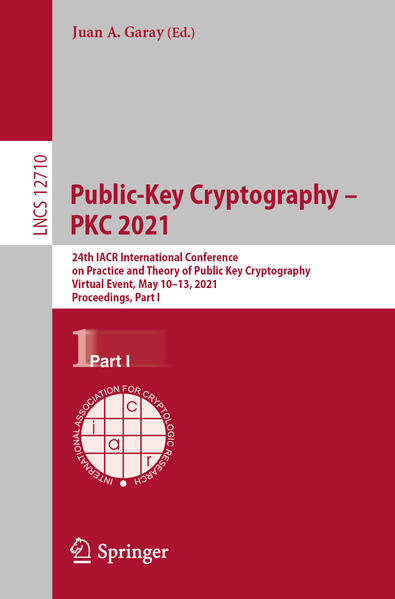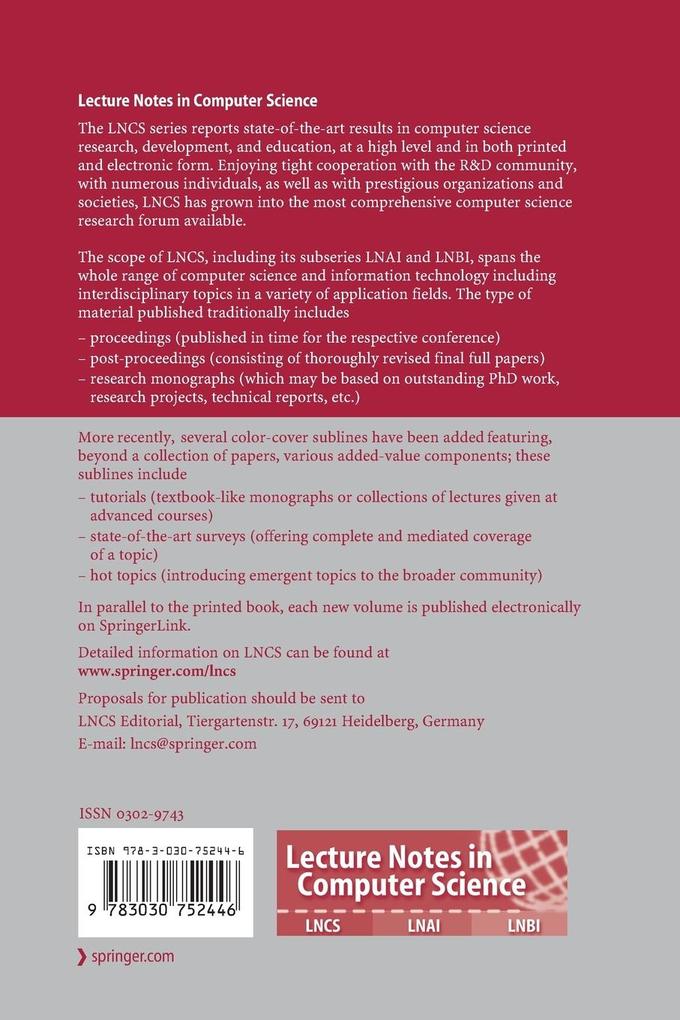
Zustellung: Fr, 13.06. - Mo, 16.06.
Versand in 2 Tagen
VersandkostenfreiBestellen & in Filiale abholen:
The two-volume proceedings set LNCS 12710 and 12711 constitutes the proceedings of the 24th IACR International Conference on Practice and Theory of Public Key Cryptography, PKC 2021, which was held online during May 10-13, 2021. The conference was originally planned to take place in Edinburgh, UK, but had to change to an online format due to the COVID-19 pandemic.
The 52 papers included in these proceedings were carefully reviewed and selected from 156 submissions. They focus on all aspects of public-key cryptography, covering theory, implementations and applications. This year, post-quantum cryptography, PQC constructions and cryptanalysis received special attention.
Inhaltsverzeichnis
Post-Quantum Constructions and Cryptanalysis. - QCCA-Secure Generic Key Encapsulation Mechanism with Tighter Security in the Quantum Random Oracle Model. - An Alternative Approach for SIDH Arithmetic. - The Convergence of Slide-type Reductions. - On the Success Probability of Solving Unique SVP via BKZ. - Two-round n-out-of-n and Multi-Signatures and Trapdoor Commitment from Lattice. - Isogeny-based key compression without pairings. - Analysis of Multivariate Encryption Schemes: Application to Dob. - On the Integer Polynomial Learning with Errors Problem. - Shorter Lattice-Based Zero-Knowledge Proofs via One-Time Commitments. - Multivariate Public Key Cryptosystem from Sidon Spaces. - Banquet: Short and Fast Signatures from AES. - Cryptographic Primitives and Schemes. - Improving Revocation for Group Signature with Redactable Signature. - Bootstrapping fully homomorphic encryption over the integers in less than one second. - Group Signatures with User-Controlled and Sequential Linkability. - Impossibility on Tamper-Resilient Cryptography with Uniqueness Properties. - Rate-1 Key-Dependent Message Security via Reusable Homomorphic Extractor against Correlated-Source Attacks. - Two-Party Adaptor Signatures From Identification Schemes. - Compact Zero-Knowledge Proofs for Threshold ECDSA with Trustless Setup. - Universal Proxy Re-Encryption. - Master-Key KDM-Secure ABE via Predicate Encoding. - Exact Lattice Sampling from Non-Gaussian Distributions. - Efficient Adaptively-Secure IB-KEMs and VRFs via Near-Collision Resistance. - Subversion-Resilient Public Key Encryption with Practical Watchdogs. - Non-Interactive CCA2-Secure Threshold Cryptosystems: Achieving Adaptive Security in the Standard Model Without Pairings. - Updatable Signatures and Message Authentication Codes. - Multi-Client Functional Encryption for Separable Functions.
Produktdetails
Erscheinungsdatum
01. Mai 2021
Sprache
englisch
Auflage
1st edition 2021
Seitenanzahl
776
Reihe
Security and Cryptology
Herausgegeben von
Juan A. Garay
Verlag/Hersteller
Produktart
kartoniert
Abbildungen
XVII, 756 p. 93 illus., 29 illus. in color.
Gewicht
1153 g
Größe (L/B/H)
235/155/42 mm
ISBN
9783030752446
Entdecken Sie mehr
Bewertungen
0 Bewertungen
Es wurden noch keine Bewertungen abgegeben. Schreiben Sie die erste Bewertung zu "Public-Key Cryptography - PKC 2021" und helfen Sie damit anderen bei der Kaufentscheidung.










